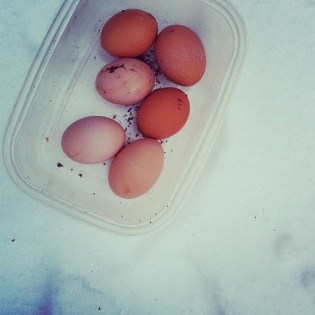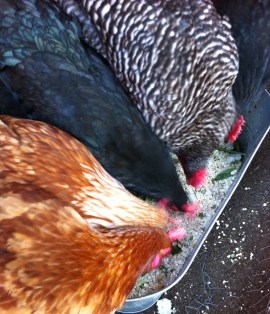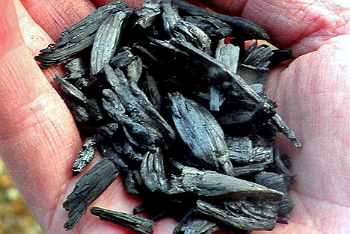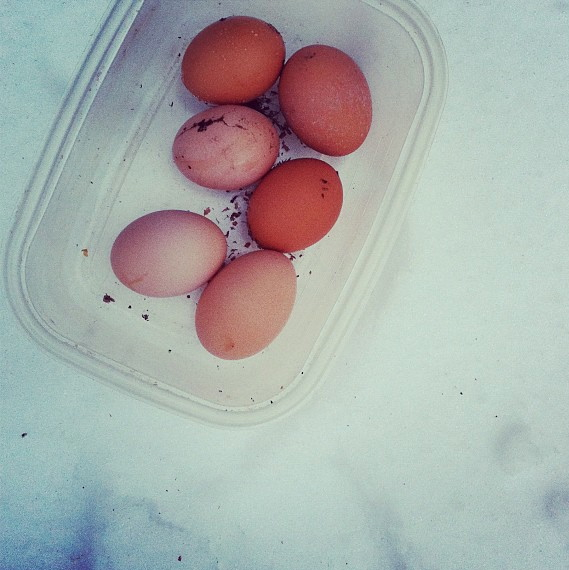
Gathering eggs in the snow (the cracked one is frozen).
Every year, I dread the arrival of winter. When leaf-watchers get jazzed and back-to-school sales are in full psychotic swing, my nail-biting worsens; my stomach turns with every minute the sun sets earlier.
This year, it was worse than usual. Since my joyful entrance into chicken-keeping last summer, the most frequently asked question I’ve heard has been: “But what happens in the winter?” “Oh,” I’d shrug, and say, as the farmer who sold us our six chickens had, “These birds are native to the Northeast. They’re fine, as long as their water doesn’t freeze.”
Nonetheless, as the stupid earth continued to revolve around the stupid sun, my anxiety became more and more precise. I pictured myself shoveling a path through four feet of snow every morning towards the chicken coop in the frigid darkness to feed the hens and defrost their water. And all for naught, since hens go on semi-strike due to lack of sunlight in winter, producing far fewer eggs. I started strategizing early: Should we install lights and put them on timers? Should we insulate the coop just in case?
In the end, the only winterizing we did was to cover their window with a sheet of plastic and their coop and outdoor run with tarps. A funny thing about chickens: They’re unwilling to change their routines, even if it improves their own comfort level. Chickens hate — hate — being wet, and yet would never think to go into their coop when it rains. Instead, they just stand in the rain and squawk. They always stay outdoors until the sun begins to set, and never a moment earlier.
So far my snow nightmare has yet to materialize. Winter in New York this year has featured sun-soaked afternoons with temperatures around 50, and even a few creepily warm days in the mid-60s. People are wearing denim jackets and strolling around warily, with question marks floating above their heads. And our chickens have continued to lay three or four eggs a day for the household, even during the shortest days.
In other words, we’ve had a lucky break, so far. But we have learned some lessons in the last couple of months — some seasonal, others budgetary.
Aquarium heaters can explode
Yep, that’s what I used to defrost the bird’s water on cold mornings. Perhaps everyone else knew that you can’t take an aquarium water heater out of the water and lay it on the ground while cleaning out and refilling a bucket. When it begins to hiss, you might have the instinct to dump water on it, but that’s when it explodes. No one was hurt in the learning of this lesson, which is all that matters. There were a few very cold days following my I Love Lucy moment, when we had to pour hot water over the ice in the chicken’s water trough in the mornings. And we have since upgraded to an automatic water dispenser, which sits on a heated base. Sometimes the right tool is worth a small investment.
 Laying hens will cuddle each other, not their eggs
Laying hens will cuddle each other, not their eggs
The only obvious change in the hens’ behavior during winter is that they huddle together even more often (and more adorably) than they do in warmer months. They now leave all their eggs in one nesting box, but because they are not laying fertilized eggs, they don’t care about them at all. On the rare days with freezing temperatures, when we were working and couldn’t get to the coop quickly, we’ve collected a few frozen eggs, or “egg popsicles,” as our dogs think of them.
Bed-Stuy is not a pasture
A few months ago, I sought the advice of experts about what to feed our chickens. In addition to good quality feed, I’ve been hoping to compensate for a true pasture experience by letting the birds out every day to forage. They were happy, and returned to the coop every day at dusk. But they quickly depleted the terrain of our “farm” and started jumping the fence to our neighbor’s yard. I wasn’t concerned, because their routines are so consistent and they came back each afternoon. Eventually they roamed several backyards away, toward the street, and we had to put the kibosh on their free-ranging.
It’s cool to be the weird food hoarder at work
For my day job I often end up on the sets of photo shoots for food magazines, where a lot of food is thrown away. I’ve begun asking food stylist friends to throw their scraps in a bag. (They’ve raved about the eggs I’ve brought them as thanks.) I don’t take anything with chemicals or mystery products, but get a generous yield of the same scraps I produce in my own kitchen: vegetable trimmings and little bits of meat or a random shrimp help replicate the pasture diet, which is diverse and rich in vitamins, minerals, and protein from plants, worms, and grubs. No, we don’t feed them chicken.
Spent grain is not chicken feed
I may or may not have boasted about my ingenious plan to barter eggs for grain leftover from the home-brewing beer process in this very column. But I did try it, and I did find interested brewers in Brooklyn. After a few schleppy-but-pleasant transactions, we found that, although chickens quite enjoy eating spent grain, large proportions of it cause them to stop laying eggs completely. I am now offering eggs in exchange for the beer itself, for human consumption. The latter feels more ingenious.
Chicken feed is not in great demand in Brooklyn
We’ve purchased organic, soy-free chicken feed at farm supply stores and directly from farmers in Upstate New York and amazingly, even found it a pet store in our neighborhood. Unfortunately, the store stocks it only sporadically; the rest of the time, they have never heard of chickens at all, let alone food for chickens. Of course, high quality feeds are easy to find on the internet, but shipping costs are prohibitive. Today I fed them a homemade concoction of oats, barley, peas, corn, and cabbage, but that’s not going to last long. In fact, excuse me — I have to go drive to the border of Queens and Long Island to see a guy about a 50-pound bag of pellets, if you know what I mean.



